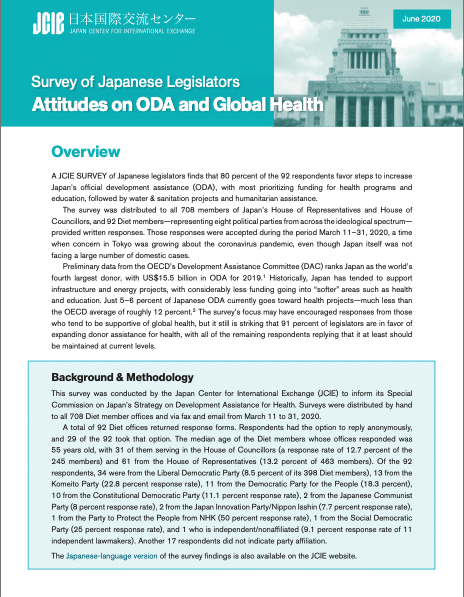Overview
A JCIE survey of Japanese legislators finds that 80 percent of the 92 respondents favor steps to increase Japan’s official development assistance (ODA), with most prioritizing funding for health programs and education, followed by water & sanitation projects and humanitarian assistance.
The survey was distributed to all 708 members of Japan’s House of Representatives and House of Councillors, and 92 Diet members—representing eight political parties from across the ideological spectrum—provided written responses. Those responses were accepted during the period March 11–31, 2020, a time when concern in Tokyo was growing about the coronavirus pandemic, even though Japan itself was not facing a large number of domestic cases.
Preliminary data from the OECD’s Development Assistance Committee (DAC) ranks Japan as the world’s fourth-largest donor, with US$15.5 billion in ODA for 2019.1 Historically, Japan has tended to support infrastructure and energy projects, with considerably less funding going into “softer” areas such as health and education. Just 5–6 percent of Japanese ODA currently goes toward health projects—much less than the OECD average of roughly 12 percent.2 The survey’s focus may have encouraged responses from those who tend to be supportive of global health, but it still is striking that 91 percent of legislators are in favor of expanding donor assistance for health, with all of the remaining respondents replying that it at least should be maintained at current levels.
Although we must avoid extrapolating too much from this limited pool of respondents, it was striking that sentiments were remarkably consistent across party lines, with 80 percent of members from the center-right ruling party, the Liberal Democratic Party (LDP), coming down in favor of increasing ODA, and 86 percent of respondents from the main opposition parties—the Constitutional Democratic Party and the Democratic Party for the People—supporting an expansion. The only hint of opposition to increasing ODA came from small right-wing parties. Two out of the three respondents from those parties feel that ODA should be kept at the current levels or reduced. Meanwhile, all 15 respondents from the Komeito Party, a junior member of the ruling coalition, support hiking ODA. Other noteworthy findings included the following:
- More than 90 percent of the Diet members who responded feel that ODA should, first and foremost, be a tool for advancing global peace and stability or for supporting Japan’s foreign policy, with a surprisingly small number—just over 3 percent—placing top priority on commercial motives such as aiding Japanese exporters or securing energy supplies and natural resources.
- Within the health field, respondents feel it is most important for Japan to direct funding toward communicable diseases (HIV/AIDS, malaria, tuberculosis, dengue fever, etc.), followed by maternal and child health. By comparison, there is relatively low support for prioritizing noncommunicable diseases and healthcare workforce training.
- Currently, half of Japan’s ODA is provided on a bilateral basis, with the other half being channeled through UN agencies and other multilateral organizations. Nearly 70 percent of Diet members feel it is important for Japan to be sufficiently represented on the governing boards of the multilateral organizations it supports, with 40 percent responding that it is the single most important request that they would have of those organizations.
Background & Methodology
This survey was conducted by the Japan Center for International Exchange (JCIE) to inform its Special Commission on Japan’s Strategy on Development Assistance for Health. Surveys were distributed by hand to all 708 Diet member offices and via fax and email from March 11 to 31, 2020.
A total of 92 Diet offices returned response forms. Respondents had the option to reply anonymously, and 29 of the 92 took that option. The median age of the Diet members whose offices responded was 55 years old, with 31 of them serving in the House of Councillors (a response rate of 12.7 percent of the 245 members) and 61 from the House of Representatives (13.2 percent of 463 members). Of the 92 respondents, 34 were from the Liberal Democratic Party (8.5 percent of its 398 Diet members), 13 from the Komeito Party (22.8 percent response rate), 11 from the Democratic Party for the People (18.3 percent), 10 from the Constitutional Democratic Party (11.1 percent response rate), 2 from the Japanese Communist Party (8 percent response rate), 2 from the Japan Innovation Party/Nippon Isshin (7.7 percent response rate), 1 from the Party to Protect the People from NHK (50 percent response rate), 1 from the Social Democratic Party (25 percent response rate), and 1 who is independent/nonaffiliated (9.1 percent response rate of 11 independent lawmakers). Another 17 respondents did not indicate party affiliation.
The Japanese-language version of the survey findings is also available on the JCIE/Japan website.
Detailed Findings
PART 1: ATTITUDES ON JAPAN’S ODA
What are your thoughts on the level of Japan’s ODA?
Which of the following is closest to your thinking?
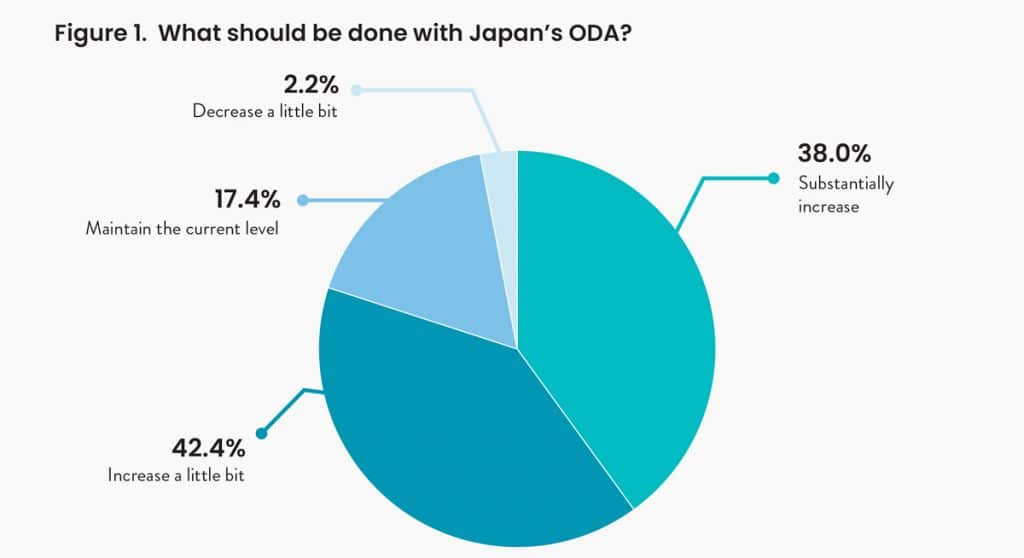
Out of the 92 respondents, 74 Diet members (80.4 percent) feel that Japan either should “substantially increase ODA” or “increase ODA a little bit,” while 16 respondents (17.4 percent) answered “maintain the current level of ODA.” The remaining 2 respondents chose “decrease ODA a little bit,” while no one selected “eliminate ODA.”
Among the four major political parties, every single Komeito and Constitutional Democratic Party respondent feels that ODA should be increased, as do 80 percent of respondents from the LDP and 73 percent from the Democratic Party for the People. The Constitutional Democratic Party of Japan members showed the most support for significant hikes rather than a marginal expansion, with 60 percent feeling Japan should “substantially increase” ODA, followed by the LDP (44 percent), Komeito (40 percent), and the Democratic Party for the People (17 percent).
All the same, it is important to note that the total response rate was 13 percent, or 92 out of 708 Diet members, so these results should not be viewed as representing the views of all Diet members.
If your response to the first question was “substantially increase ODA,” “increase ODA a little bit,” or “maintain the current level of ODA,” please indicate which of the following most closely matches your rationale.
(You can make multiple selections, and please also indicate which of those you feel is the single most important.)
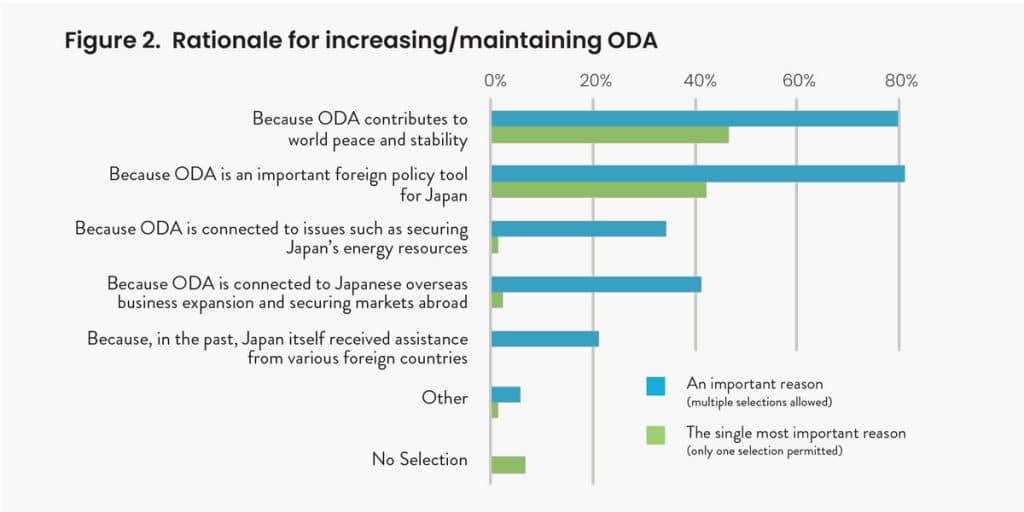
Other Responses
- Because we must work to achieve the 0.7 percent ODA/GNI target that was globally agreed to as the goal for developed nations. (1 person)
- Because we must try to fill the gap left by the US Trump administration’s lack of enthusiasm for international cooperation. (1 person)
- Because Japan’s role in the future is to be a leader on the values of freedom, peace, and human rights. (1 person)
- As a country that relies on other countries, we should of course return that benefit. It is our clear obligation to help people and countries that are in distress. (1 person)
More than 80 percent of respondents who support increasing or maintaining the level of Japan’s ODA
indicated that a leading reason is “because ODA is an important foreign policy tool for Japan,” and 80 percent also explain “because ODA contributes to world peace and stability” (multiple responses permitted). When asked to select the single most important reason for increasing or maintaining ODA at current levels, 90 percent of respondents selected one of these two responses.
When multiple responses were permitted, roughly 30–40 percent of respondents selected “because it
is connected to issues such as securing Japan’s energy resources” or “because it is connected to Japanese
overseas business expansion and securing markets abroad.” However, when limited to the single most
important reason for their answer, only one person indicated that the rationale should be to secure energy resources and just two feel it should be expanding markets abroad.
If your response to the first question was “decrease ODA a little bit” or “eliminate ODA,” please indicate which of the following most closely matches your rationale.
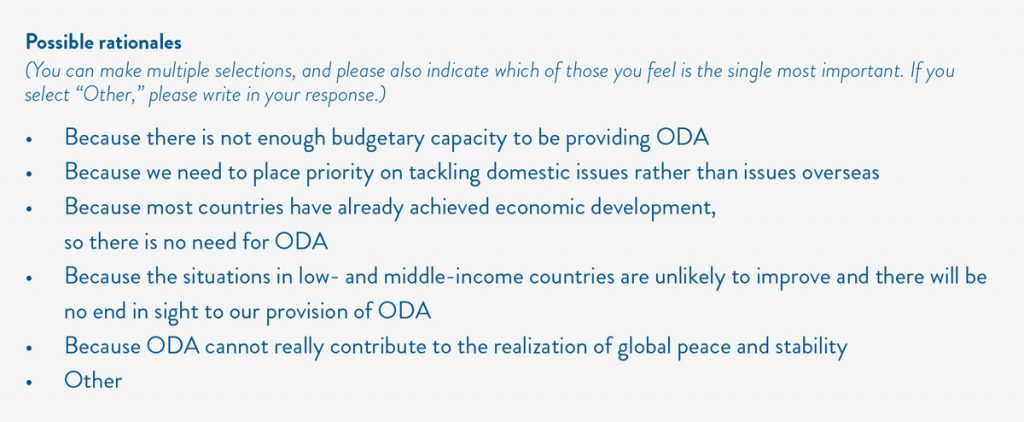
The two Diet members who feel that ODA should be decreased gave as their reasons “Most countries have already achieved economic development, so there is no need for ODA,” “Because we need to place priority on tackling domestic issues rather than issues overseas,” and “Other—Because the appreciation and
influence we receive is not commensurate with the amount given.”
The categories below indicate how Japan’s bilateral ODA was directed in 2017. Which of these areas do you feel should be prioritized in bilateral ODA?
(You can make multiple selections, and please also indicate which of those you feel is the single most important.)
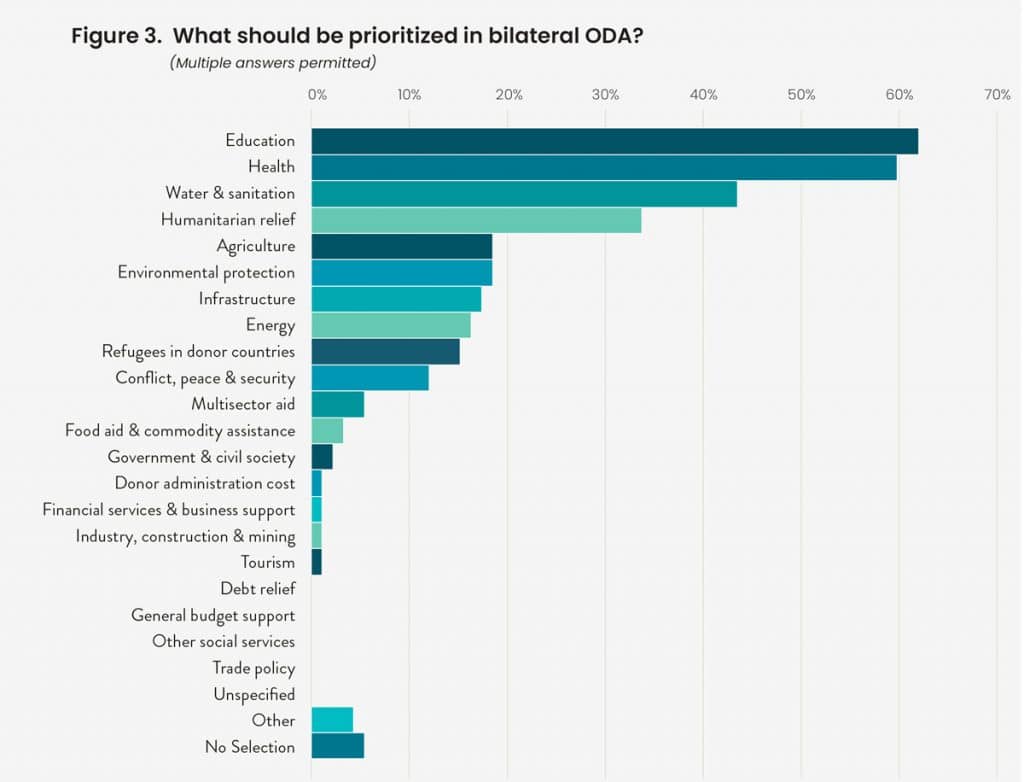
When asked which areas of bilateral ODA Japan should prioritize (multiple answers permitted), the leading responses were education (62.0 percent), health (59.8 percent), water & sanitation (43.5 percent), and humanitarian assistance (33.7 percent).
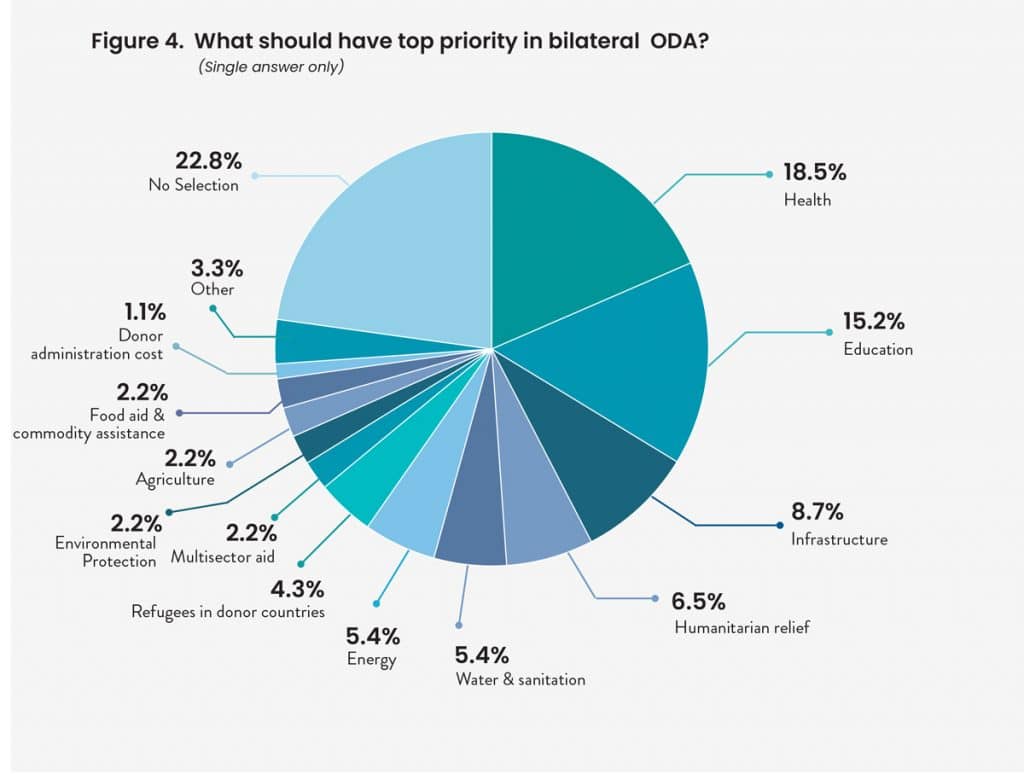
When asked to select a single field that should be accorded the highest priority, health garnered the most support (18.5 percent), followed by education (15.2 percent) and infrastructure (8.7 percent). There was a wide range of responses and no evident differences were seen across political parties
PART 2: ATTITUDES ON ODA FOR GLOBAL HEALTH
From 2011 to 2017, the proportion of ODA directed by the G7 countries toward health-related activities averaged around 12 percent. Japan’s donor assistance for health has ranged from 3 percent to 6 percent, or roughly 80 to 100 billion yen per year. What do you think should be done regarding the amount of Japanese donor assistance for health?
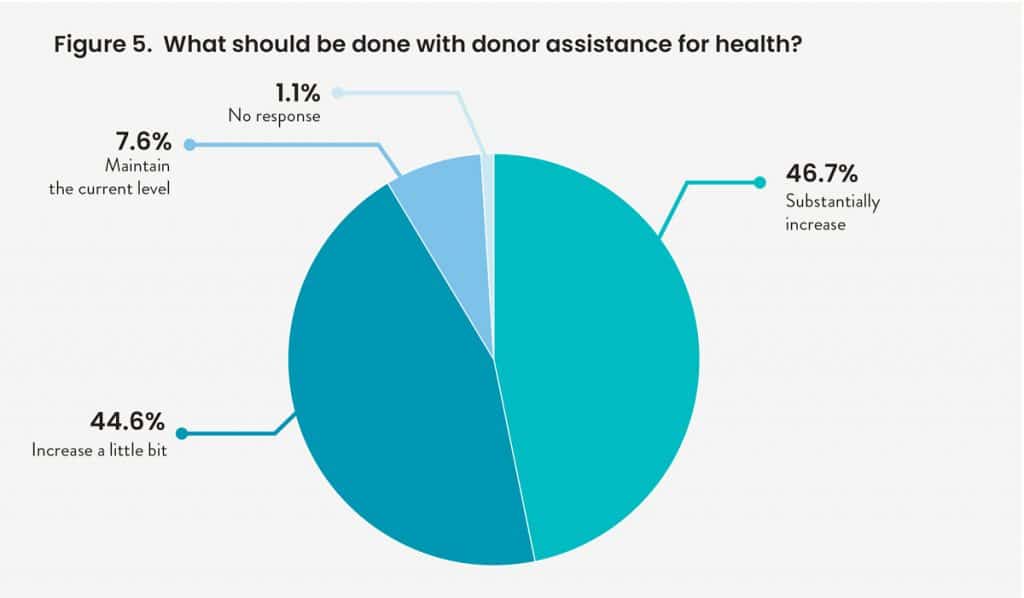
Among the four largest political parties, every single Komeito and Constitutional Democratic Party member believes that ODA should be increased for health, and the overwhelming majority of respondents from the LDP and the Democratic Party for the People agree. Roughly half of the respondents from all four of these parties wish to “substantially increase” donor assistance for health.
What specific areas do you think should be prioritized in Japan’s donor assistance for health?
(You can make multiple selections, and please also indicate which of those you feel is the single most important. If you select “Other,” please write in your response.)
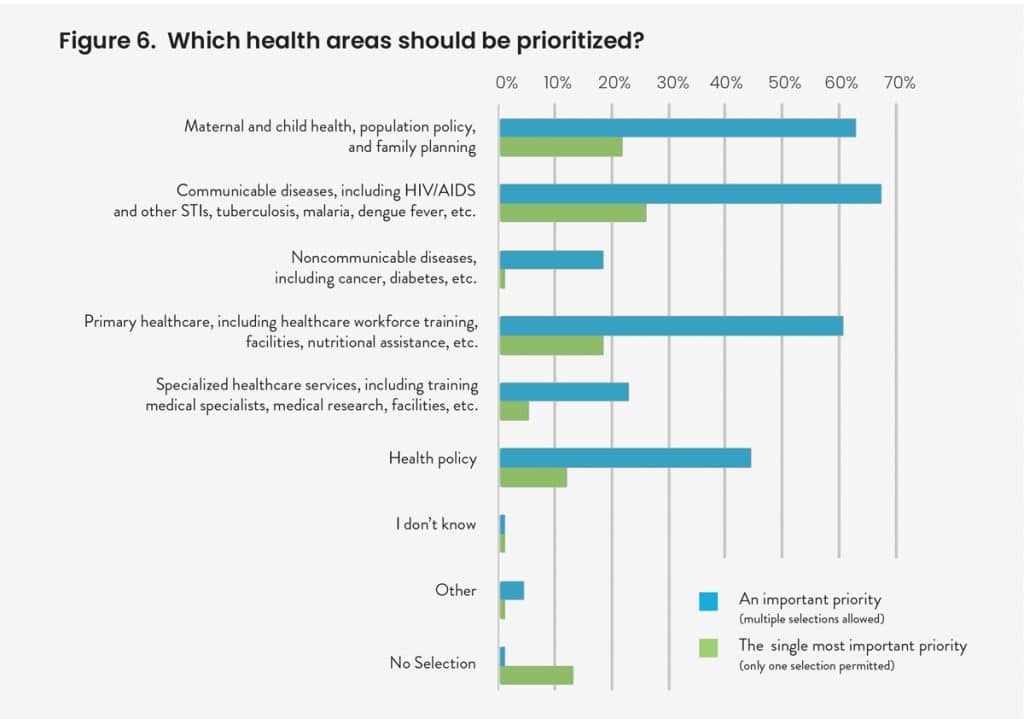
Other Responses
- Public health education. (1 person)
- Medical assistance for refugee camps, and support for mother and child handbooks and exam systems in the maternal and child health field. (1 person)
These three categories also ranked as the top three when respondents were asked to pick the single area that should be the the top priority: communicable diseases (26.1 percent), maternal and child health (21.7 percent), and primary healthcare (18.5 percent).
What types of indicators make it easier for you to explain the uses of Japan’s donor assistance for health to voters in your electoral district?
(You can make multiple selections, and please also indicate which of those you feel is the single most important. If you select “Other,” please write in your response.)
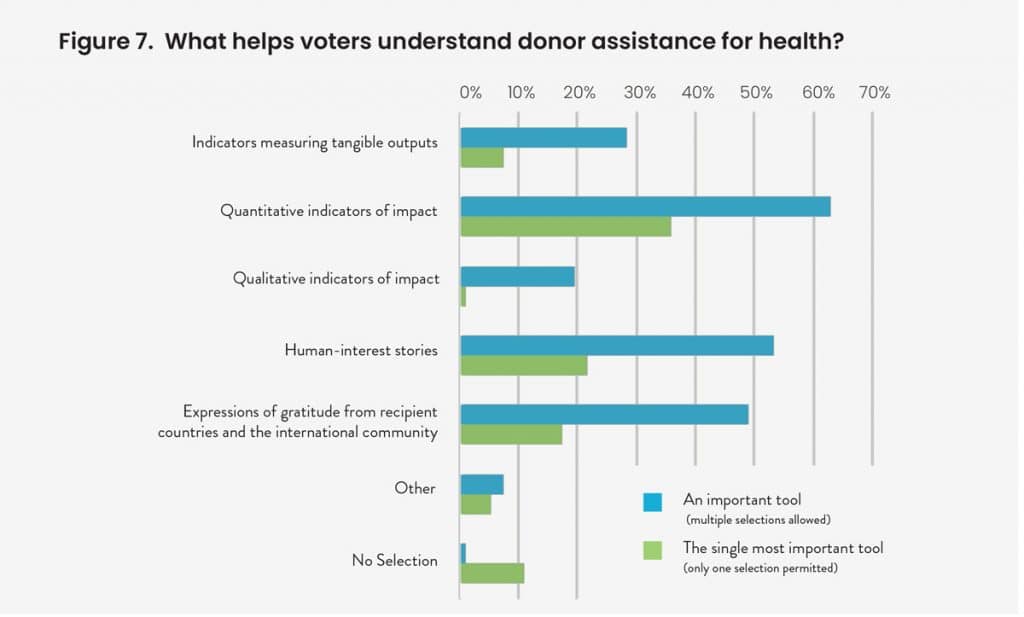
Other Responses
- We need output indicators, but the most important thing is outcome indicators, such as decreased prevalence of diseases, etc. (1 person)
- Even if there are no results, I explain it as Japan’s duty as a developed country that is part of the international community. (1 person)
- It isn’t an election issue. (1 person)
- I’m not planning on explaining it to the voters in my district. Even if I explained it, they wouldn’t listen. (1 person)
- Changes in the average life expectancy in recipient countries. (1 person)
- Connection to Japan’s national interest. (1 person)
When asked what is most helpful in explaining to their constituents why it is important to fund health projects— and when allowed multiple selections—the largest number of respondents feel it is “quantitative indicators” (63.0 percent). That is followed by “human-interest stories” (53.3 percent) and “expressions of gratitude from recipient countries and the international community” (48.9 percent). When asked to select a single tool that was most important, 35.9 percent of respondents chose “quantitative indicators.”
Roughly 50 percent of Japan’s donor assistance for health is provided as bilateral ODA, and the remaining 50 percent is disbursed as multilateral support for low- and middle-income countries through UN agencies and other international organizations. What considerations does Japan need to take into account when providing donor assistance for health through UN agencies and international organizations?
(You can make multiple selections, and please also indicate which of those you feel is the single most important. If you select “Other,” please write in your response. Note: Examples of UN agencies and international organizations in the health field include the UNDP, UNAIDS, UNICEF, UNFPA, World Food Programme, UN Women, WHO, Gavi, Global Financing Facility, The Global Fund to Fight AIDS, Tuberculosis and Malaria, Unitaid, etc.)
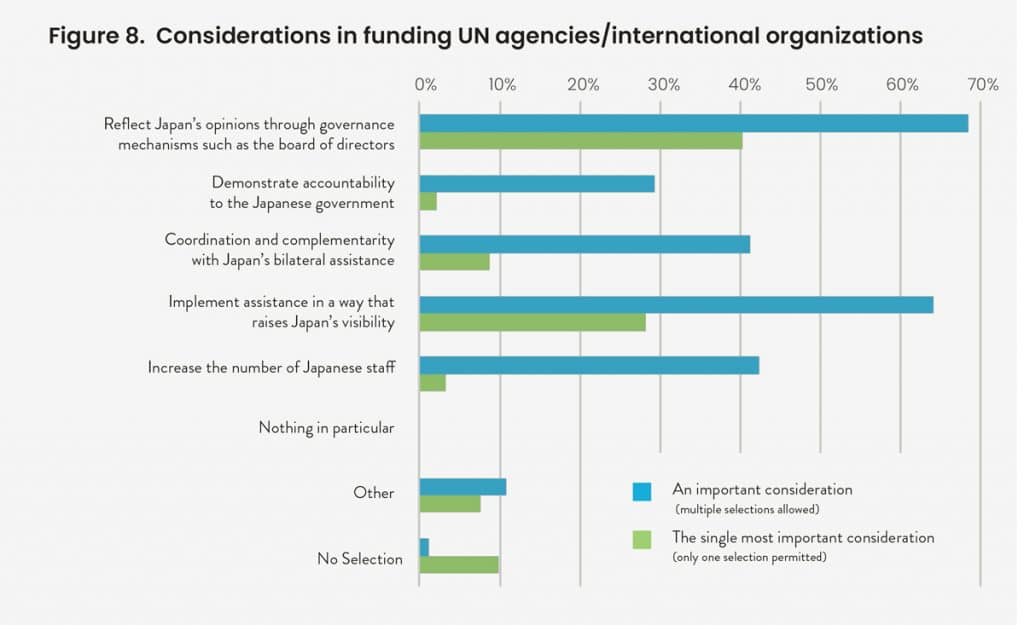
When asked about the considerations that Japan needs to take into account when contributing to international organizations, more than 60 percent of Diet members selected “reflect Japan’s opinions through governance mechanisms” and “raises Japan’s visibility,” while more than 40 percent chose “increase the number of Japanese staff” and “coordination and complementarity with Japan’s bilateral assistance” (multiple answers permitted).
“Reflect Japan’s opinions through governance mechanisms” is seen as the single most important consideration, and it was selected by roughly 40 percent of respondents.
Other Responses
- Maintaining consistency in funding. (2 people)
- Through the use of Japan’s best practices and experiences, problems in various fields can be solved more rapidly. (1 person)
- Convey more concretely how the situation compares with what is seen in Japan. (1 person)
- The government has a responsibility to explain more to the people. (1 person)
- Producing results commensurate to the institution’s program costs. (1 person)
- Transparency about the use and impact of funding. (1 person)
- The organization must operate in a fair and neutral manner and be grounded on a strong foundation. (1 person)
- Needs of the international community. (1 person)
- It is best not to emphasize Japan’s national interests. We must act for the global common interest. (1 person)
NOTES
1. “ODA 2019 Preliminary Figures,” OECD Development Finance Data, http://www.oecd.org/development/financing-sustainable-development/development-finance-data/.↩
2. Data compiled by Shuhei Nomura based on OECD/DAC data for the Special Commission on Japan’s Strategy on Development Assistance for Health, November 19, 2019.↩
CREDITS
This survey was designed and carried out by Shiori Nagatani and Tomoko Suzuki at JCIE/Japan as part of JCIE’s Global Health and Human Security Program. Their analysis was supplemented by James Gannon at JCIE/USA, and his colleagues Kim Ashizawa, Staci Custus, and Kiyoko Shiromasa oversaw English-language translation, design, and layout. For more information, please contact Shiori Nagatani.

